This article was co-authored by Denise Stern. Denise Stern is a Parenting Specialist and the CEO of Let Mommy Sleep, the country’s leading Baby Nurse and Postpartum Care service. Denise specializes in providing nurturing care to newborns and evidence-based education to their parents. She holds a BA in Public Relations from North Carolina State University. Denise was the US Chamber of Commerce Leading Woman-Owned Business in 2013, a Washington FAMILY Magazine Mother of the Year in 2016, and on the elite White House Summit for Working Families hosted by the President and First Lady Obama in 2014. Let Mommy Sleep is the only company of its kind that holds a local government contract to teach newborn and postpartum care.
There are 14 references cited in this article, which can be found at the bottom of the page.
This article has been viewed 41,523 times.
Bathing your baby boy is important to his health and wellbeing. You don’t need to bathe him every day, although you can if he enjoys it. You can give him a sponge bath sometimes, and a full bath every few days. For a full bath, gently wash him in a tub of warm water.
Steps
Drawing the Bath
-
1Gather together everything you need. To give your baby a bath, you will need to gather together a clean tub to use, such as a washing-up tub or special baby bath, two towels and some cotton wool (cotton balls). You will also need a cup to use to rinse him and a washcloth. You should also grab a clean diaper and some fresh clothes that you will dress him in after the bath.[1]
-
2Fill the tub with warm water. The amount of water you are recommended to use can vary, but often parents are advised to add 2 to 3 inches. If you use this amount, you should carefully pour warm water from the tub over you baby during the bath to keep him warm.[4]Advertisement
-
3Wash his face. You can wash your boy’s face before you put him into the tub. Take off all his clothes apart from a onesie and his diaper, wrap him in a towel and then hold him on your knee or lay him on his changing mat. Dip a cotton ball in the bath water and gently wipe around his eyes, from the nose outwards towards the ears. Do this with a fresh piece of cotton wool for each eye[7]
- Then get a fresh cotton ball, dip it in the bath water and wash gently around his ears, but not inside them.
- Repeat this with a fresh cotton ball around his other ear.
- Then dampen some more cotton balls and wash the rest of his face, neck and hands.
- Gently dry him with a soft towel.[8]
-
4Take off his diaper. To finish preparing him for the bath, take off his onesie and diaper and clean around his bottom and genitals with some fresh cotton wool that has been dipped in the warm water. It’s important to clean up any mess before you put him into the tub.[9]
- This step is just to clean off any surface soiling. It is not a thorough cleaning of the area — this comes later.
Bathing Your Baby Boy
-
1Place your baby in the tub. Once you are ready to place your boy in the bath, lower him gently into the tub. Use one hand to hold his upper arm and support his head, neck, and shoulders as you do this.[10]
-
2Wash his hair. If your baby has hair, you should wash it if it seems dirty or he is developing cradle cap. (This is a common condition which brings about scaly patches of skin on the baby’s scalp.) Support his head and shoulders with one hand, and then gently massage a drop of mild baby shampoo into his scalp.[11]
-
3Wash his body. Dip a washcloth in warm water and wash your baby’s neck and torso. You usually don’t need soap when cleaning most parts of a baby, so the plain water in the bath is fine. Clean under his arms and between his fingers, then clean his legs and toes. Make sure you are cleaning the folds and creases in your baby's skin.[14]
- In addition to using a washcloth, you can gently swish the water over his body, but take care not to splash him.
- Always use one hand to support his body at all times, keeping his head well up above the water line.
- Never leave him unattended in the bath for even a second.[15]
-
4Clean the diaper area. Use a clean cloth or cotton ball dipped in the water to carefully wash around his bottom and genitals. If your baby boy is uncircumcised, don’t try to pull back the foreskin. The foreskin will separate from the head of the penis over time, and you should allow this to happen naturally.
- If you try to force to foreskin back to clean the head of the penis, you may cause a tear in the skin, which can cause problems later on.
- If he has been circumcised, follow the instructions your doctor gave you.
- A circumcised penis may take a week to ten days to heal.
- Again, once your baby is older than a few weeks, you can use a use mild baby soap to clean his bottom, genitals, and the folds of his skin. Avoid products with alcohol or perfume.[16]
Taking Him Out of the Tub
-
1Dry him off. When you are finishing with the bath, lift out and him and pat him dry with a clean, warm towel. Be sure to pay close attention to the folds in his skin where moisture can gather. Drying inside the folds of the skin is the best way to avoid rashes for a very young baby.[17]
-
2Give him a massage. After bathing is a great time to give your baby a quick massage. A massage can help calm and relax him, and can help him go to sleep. If your baby has dry or eczema-prone skin, squirt some hypoallergenic lotion onto your palms, rubbing them together to warm up the lotion. Then massage it into his skin.
- To avoid skin irritation, don’t use any lotions or oils until your baby is at least a month old.[18]
-
3Put on his diaper and clothes. Once your baby is dry and massaged, put him in a clean diaper and clothes.
Expert Q&A
-
QuestionWhat is the best shampoo for baby hair?
 Denise SternDenise Stern is a Parenting Specialist and the CEO of Let Mommy Sleep, the country’s leading Baby Nurse and Postpartum Care service. Denise specializes in providing nurturing care to newborns and evidence-based education to their parents. She holds a BA in Public Relations from North Carolina State University. Denise was the US Chamber of Commerce Leading Woman-Owned Business in 2013, a Washington FAMILY Magazine Mother of the Year in 2016, and on the elite White House Summit for Working Families hosted by the President and First Lady Obama in 2014. Let Mommy Sleep is the only company of its kind that holds a local government contract to teach newborn and postpartum care.
Denise SternDenise Stern is a Parenting Specialist and the CEO of Let Mommy Sleep, the country’s leading Baby Nurse and Postpartum Care service. Denise specializes in providing nurturing care to newborns and evidence-based education to their parents. She holds a BA in Public Relations from North Carolina State University. Denise was the US Chamber of Commerce Leading Woman-Owned Business in 2013, a Washington FAMILY Magazine Mother of the Year in 2016, and on the elite White House Summit for Working Families hosted by the President and First Lady Obama in 2014. Let Mommy Sleep is the only company of its kind that holds a local government contract to teach newborn and postpartum care.
Parenting Specialist Always use a gentle baby shampoo. Check the label on the shampoo to make sure it's made for babies.
Always use a gentle baby shampoo. Check the label on the shampoo to make sure it's made for babies.
References
- ↑ http://www.nhs.uk/conditions/pregnancy-and-baby/pages/washing-your-baby.aspx
- ↑ https://www2.hse.ie/wellbeing/babies-and-children/parenting-advice/caring-for-a-new-baby/how-often-to-bathe/
- ↑ https://www.nationwidechildrens.org/family-resources-education/health-wellness-and-safety-resources/helping-hands/bathing-your-baby
- ↑ https://www.eehealth.org/blog/2018/06/are-you-bathing-your-child-correctly/
- ↑ https://www.stanfordchildrens.org/en/topic/default?id=bathing-and-skin-care-for-the-newborn-90-P02628
- ↑ http://www.nhs.uk/conditions/pregnancy-and-baby/pages/washing-your-baby.aspx
- ↑ https://www.healthychildren.org/English/ages-stages/baby/bathing-skin-care/Pages/Bathing-Your-Newborn.aspx
- ↑ http://www.nhs.uk/conditions/pregnancy-and-baby/pages/washing-your-baby.aspx#wash-baby-face
- ↑ https://www.hopkinsmedicine.org/howard_county_general_hospital/services/mothers_and_babies/taking_baby_home/baby-hygiene.html
- ↑ http://www.nhs.uk/conditions/pregnancy-and-baby/pages/washing-your-baby.aspx
- ↑ https://www.healthychildren.org/English/ages-stages/baby/bathing-skin-care/Pages/Cradle-Cap.aspx
- ↑ https://www.eehealth.org/blog/2018/06/are-you-bathing-your-child-correctly/
- ↑ Denise Stern. Parenting Specialist. Expert Interview. 19 February 2021.
- ↑ https://www.beaumont.org/health-wellness/blogs/best-bathing-tips-for-your-newborn
- ↑ http://www.nhs.uk/conditions/pregnancy-and-baby/pages/washing-your-baby.aspx
- ↑ http://www.babycentre.co.uk/a115/caring-for-your-babys-genitals
- ↑ http://www.mayoclinic.org/healthy-lifestyle/infant-and-toddler-health/in-depth/healthy-baby/art-20044438?pg=2
- ↑ http://www.nhs.uk/conditions/pregnancy-and-baby/pages/washing-your-baby.aspx
- ↑ http://www.parents.com/baby/care/bath/baby-sponge-baths/
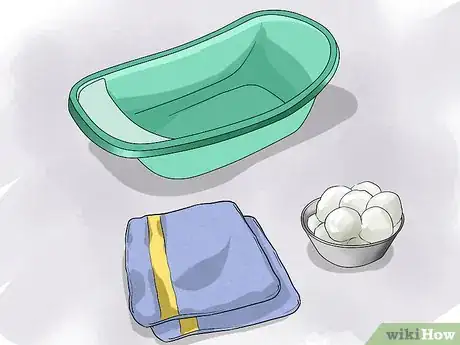
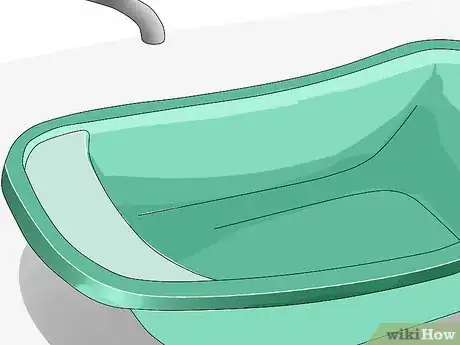
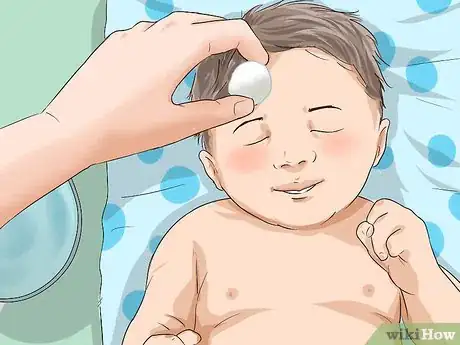
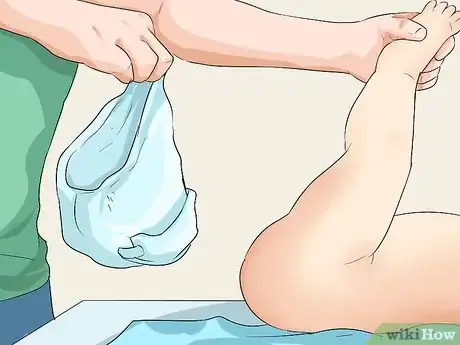
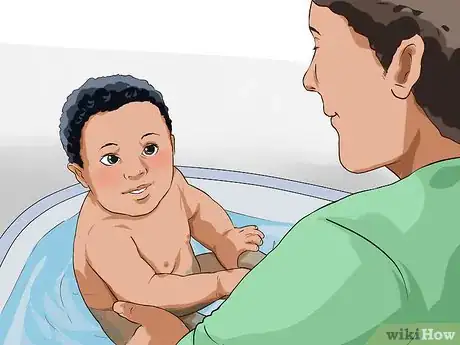
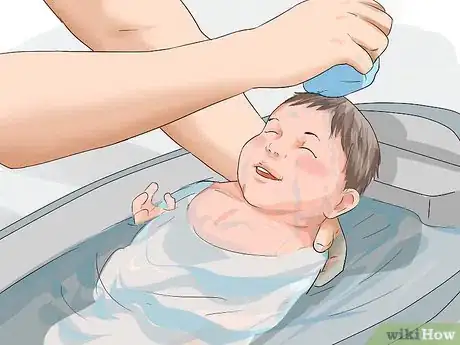

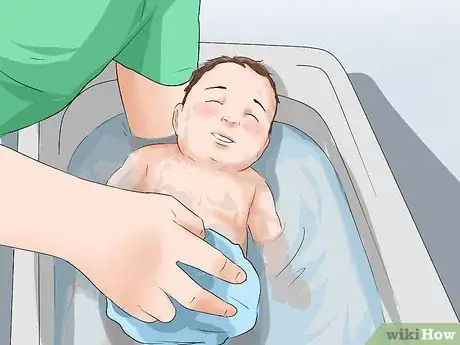
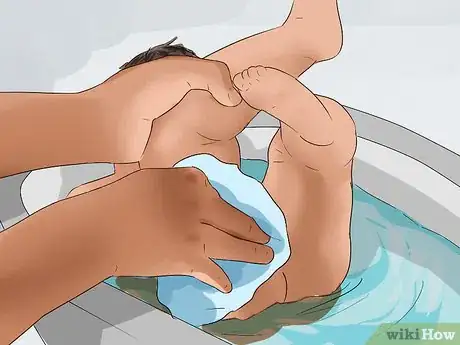
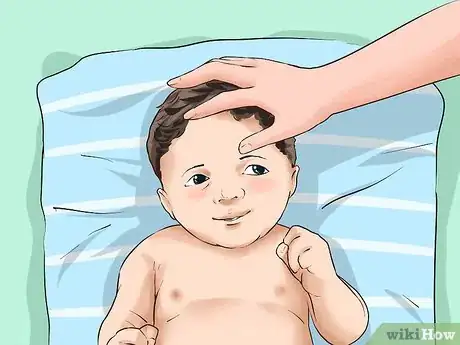
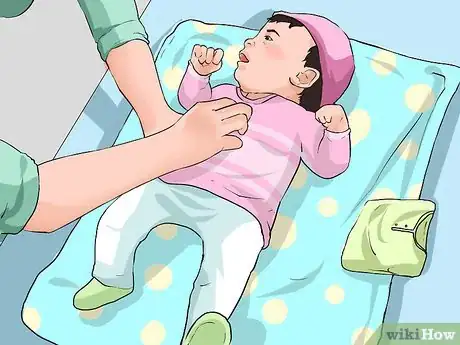
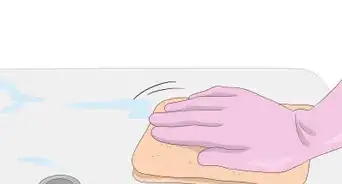
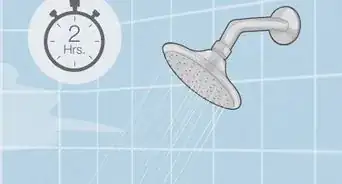

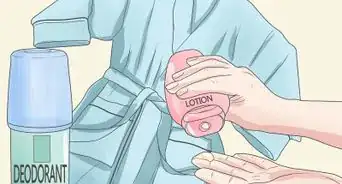

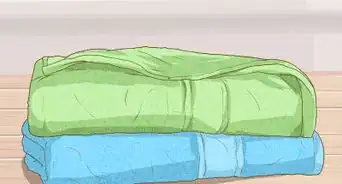
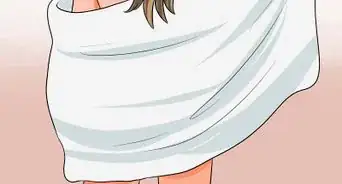

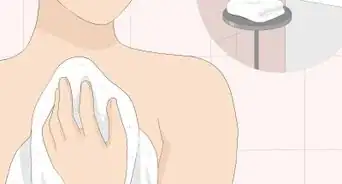
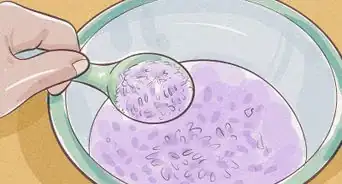

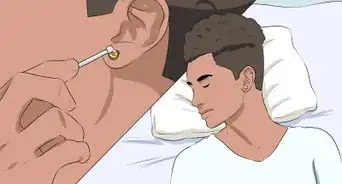
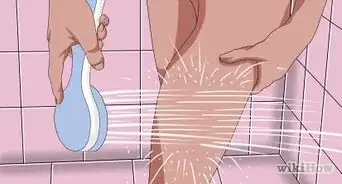







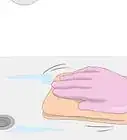


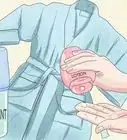



































Medical Disclaimer
The content of this article is not intended to be a substitute for professional medical advice, examination, diagnosis, or treatment. You should always contact your doctor or other qualified healthcare professional before starting, changing, or stopping any kind of health treatment.
Read More...